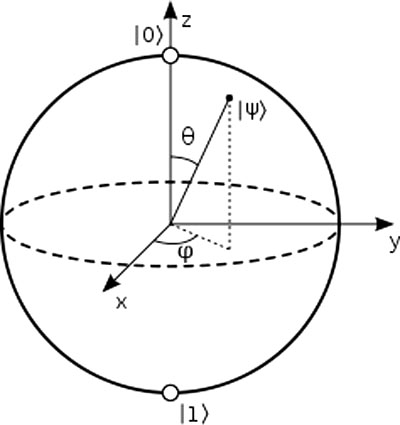|

by Alex Knapp
Forbes Staff
April 15, 2011
from
Forbes Website

Poincare sphere
Ageometrical
representation of electromagnetic polarizations
Image via Wikipedia
Quantum teleportation: the name brings
Star Trek to mind, although that’s not quite accurate.
What quantum teleportation really
transmits isn’t people, but rather information (called “qubits”,
as an analogue to the classic “bit” that we use to slice up memory
in traditional computing).
In theory, quantum teleportation is the
transmitting of cubits from one position to another without the
qubits travelling in the intervening space.
Reliable transmission of qubits is something that’s necessary for
the development of quantum computers. Quantum computers, if they’re
possible to build, would in theory be able to take advantage of
quantum mechanical algorithms, enabling them to use algorithms that
can perform calculations much, much faster than traditional
computers.
So ever since quantum teleportation technology was first proposed in
the late 1990s, there have been two major avenues of research. The
first is being able to transmit information over long distances -
right now, the longest distance claimed is about 10 miles by
researchers in China. But the second important avenue of research is
maintaining the integrity of the signal.
Right now, the nature of quantum
teleportation is such that there’s an inevitable loss of integrity -
the quantum teleporter equivalent of the scene in Galaxy Quest when
an animal is beamed up to the ship - inside-out.
But now researchers at the
University of New South Wales
may have
achieved a breakthrough in
maintaining the integrity of qubits during the quantum teleportation
process.
They successfully transmitted large,
complex sets of information quickly, without loss of integrity.
Professor
Elanor Huntington, in the
School of Engineering and Information
Technology at UNSW’s Canberra campus at the
Australian Defence Force Academy (ADFA), was part of a team led
by University of Tokyo researchers.
She said the team’s achievement was
another step towards building a super-powerful quantum computer
and transmitting quantum information.
“Just about any quantum
technology relies on quantum teleportation. The value of
this discovery is that it allows us, for the first time, to
quickly and reliably move quantum information around. This
information can be carried by light, and it’s a powerful way
to represent and process information.
Previous attempts to transmit
were either very slow or the information might be changed.
This process means we will be able to move blocks of quantum
information around within a computer or across a network,
just as we do now with existing computer technologies.
”If we can do this, we can do just about any form of
communication needed for any quantum technology.”
Before we can have quantum computing,
there are a number of physical problems that have to be solved.
But this breakthrough may be a huge step
in the right direction.
|

